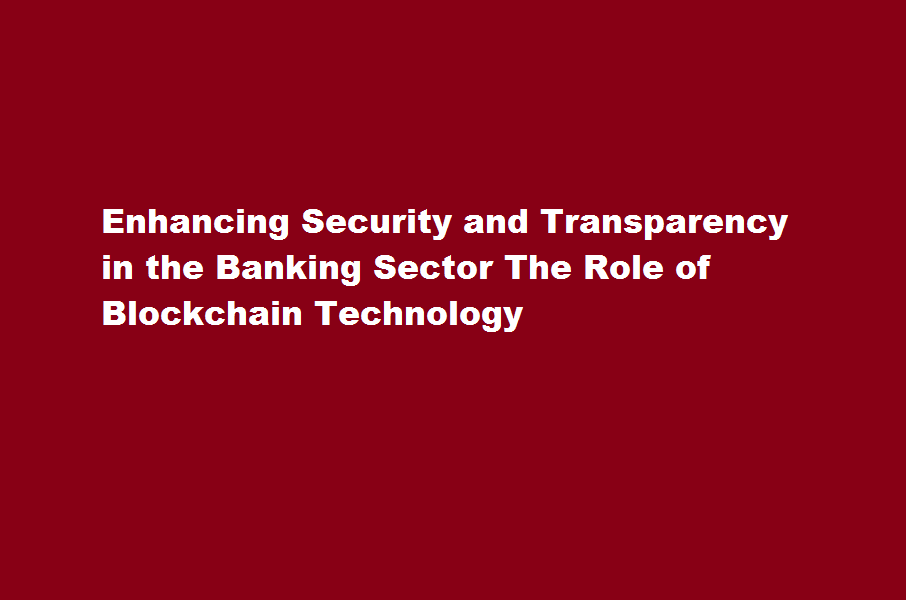Enhancing Security and Transparency in the Banking Sector The Role of Blockchain Technology
3 min read
Introduction
Blockchain technology has emerged as a game-changer in various industries, and the banking sector is no exception. With its decentralized and immutable nature, blockchain offers unique advantages that can significantly enhance security and transparency in banking operations. In this article, we will delve into the potential applications of blockchain in the banking sector and explore how it can revolutionize the industry.
Enhanced Security
Blockchain provides a secure framework for banking transactions by leveraging cryptographic algorithms. Every transaction recorded on the blockchain is encrypted and linked to the previous transaction, forming an unalterable chain. This decentralized nature eliminates the single point of failure, reducing the risk of fraud and unauthorized access.
Transparent Transactions
One of the key features of blockchain technology is transparency. In a traditional banking system, transactions are often opaque and require intermediaries to validate and settle them. Blockchain enables real-time visibility of transactions, allowing all participants to have a synchronized and shared view of the transaction history. This transparency enhances trust and reduces the need for intermediaries.
Smart Contracts
Blockchain enables the implementation of smart contracts, which are self-executing agreements with predefined conditions. Smart contracts can automate various banking processes, such as loan approvals, trade settlements, and identity verification. By eliminating the need for manual intervention, smart contracts reduce errors, streamline processes, and enhance efficiency.
Cross-Border Payments
Traditional cross-border payments are often slow, expensive, and prone to errors. Blockchain-based solutions can revolutionize this process by providing faster, cheaper, and more secure transactions. With blockchain, financial institutions can directly connect and settle payments in a peer-to-peer manner, eliminating the need for multiple intermediaries and reducing transaction costs.
Know Your Customer (KYC)
Blockchain can simplify and streamline the KYC process for banks. Currently, customers need to provide their identification documents and personal information to multiple banks, resulting in duplication of efforts and increased risk of data breaches. By leveraging blockchain, customer information can be securely stored and verified once, allowing different banks to access the verified data, enhancing efficiency, and reducing duplication.
Data Integrity and Auditability
The decentralized nature of blockchain ensures the integrity and immutability of data. Banks can use blockchain to securely store and manage critical documents, such as loan agreements, property titles, and audit records. This eliminates the risk of tampering or unauthorized modifications, providing a reliable source of truth for auditing and compliance purposes.
Conclusion
Blockchain technology holds immense potential for the banking sector to enhance security and transparency. By leveraging its decentralized and transparent nature, banks can streamline operations, reduce costs, and build trust with their customers. However, widespread adoption of blockchain in banking requires addressing scalability, regulatory challenges, and interoperability. As the technology continues to evolve, the banking industry must embrace blockchain as a transformative force that can shape the future of finance.
Frequently Asked Questions (FAQs)
How does blockchain technology enhance security in the banking sector?
Blockchain provides enhanced security in the banking sector by leveraging cryptographic algorithms, decentralization, and immutability. Transactions recorded on the blockchain are encrypted and linked to previous transactions, making it nearly impossible to alter or tamper with the data.
How can blockchain enhance transparency in banking operations?
Blockchain enables real-time visibility of transactions, creating a synchronized and shared view of the transaction history. This transparency reduces the need for intermediaries and enhances trust between participants in the banking ecosystem.
Can blockchain technology automate banking processes?
Yes, blockchain technology can automate banking processes through the use of smart contracts. Smart contracts are self-executing agreements with predefined conditions, allowing for the automation of various processes such as loan approvals, trade settlements, and identity verification.
Read Also : Unleashing The Power of LinkedIn’s “Publishing Platform” for Thought Leadership and Professional Branding






